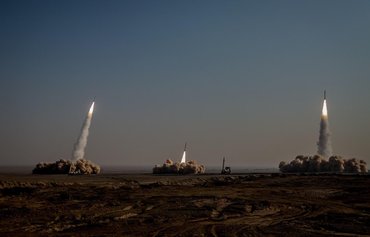Iran's Islamic Revolutionary Guard Corps (IRGC) has overextended itself in the Middle East and beyond, leaving the homeland itself vulnerable, analysts told Al-Mashareq.
For over four decades, IRGC officials have said both their regional military interventions and their activities at home are meant to keep Iran safe from its enemies.
The IRGC has virtually crippled Iran's conventional armed forces (the Artesh), taking over resources, the bulk of the annual military budget and the power of decision-making. Significant, sensitive positions not only in the military but also in political and economic domains are allotted to IRGC officials.
However, a slew of IRGC mishaps in recent years -- including the failure to protect Iran's borders and the failure to protect its missile and nuclear programmes against potential sabotage -- raise questions about Tehran's reliance and expenditure on the IRGC, analysts warn.
Ideology over expertise, technology
"The IRGC values ideology more than expertise," said a retired Iranian naval analyst who asked to remain anonymous.
"The force was formed in the early revolutionary era [early 1980s] to circumvent the professionally trained military, which revolutionaries saw as disloyal and possibly sympathetic to the West," he told Al-Mashareq.
Now it has committed Iran to proxy wars in Yemen, Iraq and Syria, while using its proxies to spread the Wilayat al-Faqih (Guardianship of the Jurist) doctrine. It also has mounted terror activity outside Iran against Western targets and the Iranian opposition, including in Germany.
But this has come at a cost.
The IRGC's focus on ideology over expertise has weakened it militarily, as evidenced by the US strike that killed its top military commander Qassem Soleimani in Baghdad in January.
At home, the IRGC has been unable to protect sensitive military, nuclear and power plants against suspected acts of sabotage.
Additionally, on June 7th, 2017, five Iranian militants mounted an armed attack on Iran's parliament (Majles) building and the mausoleum of Rouhollah Khomeini, the founder of the Islamic Republic, in Tehran.
The attacks left 17 civilians dead and 43 wounded. Two days later, then-IRGC commander Mohammad-Ali Jafari said Iran was in possession of "precise intelligence" indicating that Saudi Arabia "had requested" the attacks and Israel and the US had supported them. He implied that Saudi Arabia had used "Islamic State of Iraq and Syria" (ISIS) elements for the attacks.
"I doubt the Saudis would order a direct attack on Iranian soil, using ISIS affiliates," the retired Iranian naval analyst said. "ISIS is a threat to them, just as it is to everyone in the Muslim world."
Regardless of the IRGC's accusations against Riyadh, the fact that the terrorists were able to carry out the attack shows a weakness in the IRGC's intelligence- gathering capability, as "precise intelligence" is hardly useful after the fact, he said.
"The IRGC launched missile strikes on Deir Ezzor in retaliation, but the strikes were unsuccessful," Shahin Mohammadi, a US-based Iranian journalist, told Al-Mashareq.
At that time, Syria's Deir Ezzor province was under a large-scale siege imposed by ISIS.
Attacks inside Iran
The 2107 attack inside Iran was hardly the only one of its kind in recent memory.
On September 22nd, 2018, militants disguised as IRGC personnel attacked a military parade in Ahvaz, killing 25 people, including some civilians, and injuring at least 60, according to state media.
Both ISIS and Ahvaz National Resistance, an ethnic Arab anti-government movement inside Iran, claimed responsibility for the attack. Neither group produced evidence to back up their claims.
Foreign Minister Javad Zarif blamed "terrorists paid by a foreign regime".
An Iranian military spokesman, meanwhile, claimed the attackers "were trained and organised by two Gulf countries", and had ties to the US and Israel.
In response, the IRGC on October 1st launched missiles at a "terrorist" headquarters in Syria that it said housed "40 senior leaders" of ISIS. They said the attack had killed all ISIS members.
Iran's Fars news agency said the missiles hit the Syrian border town of Albu Kamal in Deir Ezzor province.
However, the Pentagon said at the time that the missile strikes caused "no damage".
"The IRGC lacks reliable guided radar technology that would make such missile strikes a success," the former Iranian naval analyst said.
"They are either buying the equivalent of second-hand material from China and North Korea, or making inferior copies of what they can get their hands on," he said, adding that the IRGC has tried to compensate for these shortcomings by prioritising the quantity of missiles at Iran's disposal over the quality.
Lack of safeguarding measures
Even as the IRGC boasts of large numbers of missiles to deter Iran's perceived enemies, it has failed to put proper measures in place to safeguard its missile programme.
An explosion on June 25th at the Khojir missile facility, one of Iran's largest and most complex weapons depots, shook the area east of Tehran.
IRGC officials blamed the explosion on an unidentified gas leak, but the explosion was one of three major blasts around the same time, including one at the Natanz centrifuge production facility in Esfahan province on July 2nd.
Between late June and mid-October, there were at least 10 other major incidents, including fires and explosions at petrochemical facilities and power plants.
The IRGC and other hardline power centres in Iran "would rather spend significant sums of money on spreading Shiism abroad than invest in upgrading and protecting Iran's technological infrastructure", the naval analyst said.
Moreover, neither the IRGC nor other hardline factions of the regime appear to have much interest in protecting the public and prioritising them over Tehran's expansionist policies, he said.

![A corridor in Iran's Majles after the 2017 ISIS attack. [Photo via ISNA]](/cnmi_am/images/2020/11/16/26794-Iran-ISIS-attack-600_384.jpg)






